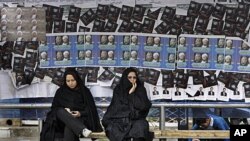Iran's Parliamentary Elections Facts
- Candidates are cleared by the Guardian Council.
- 3,444 candidates are running out of the 5,395 who registered.
- Parliament has 290 seats.
- Voters must be over 18 years old.
- 48 million people of Iran's 74 million strong population are eligible to vote.
- Ballots are counted manually.
In an election with millions of voters and hundreds of candidates, the two most important figures in Iran's parliamentary ballot aren't running for office.
But analysts say differences between President Mahmoud Ahmadinejad and Supreme Leader Ayatollah Ali Khamenei will affect the results.
The two leaders represent a contest among religious and political conservatives that will play out in Friday's voting.
“There’s only one side that can really win in that confrontation and that’s the Supreme Leader, who holds most of the key powers of state, who controls the conditions under which these elections will be fought," said Shashank Joshi, an analyst with the London-based Royal United Services Institute.
"What’s become very apparent is that the presidency’s standing, its status is going to come out of this process probably fairly bruised,” he said.
First election since 2009
Friday’s vote is the first national election in Iran since the disputed 2009 presidential run-off.
The outcome of that election triggered widespread street protests and a brutal crackdown on the opposition, or ‘Green Movement,’ in which dozens of people were killed.
Reformist leaders, including Mir Hossein Mousavi and Mehdi Karroubi, have been under house arrest for more than a year. They have called for a boycott of the parliamentary election, claiming it is rigged.
“The indicators are the Green Movement is dead," said analyst Joshi. "And if it’s there, it’s really only the embers of the movement left," he said. "There is very little indication we’re going to see anything like the similar protests.”
The poll comes as Iran faces increasing isolation over its nuclear program and accusations that human rights abuses have worsened in the run-up to the vote.
President Ahmadinejad draws his support from Iran’s working class. But soaring inflation and cuts to fuel and food subsidies threaten to undermine that support base.
Western sanctions on Iran over its disputed nuclear activities are starting to hurt economically.
But analyst Joshi says the election results will not prompt any re-thinking of Iran's nuclear policy.
“Ahmadinejad has benefited from his populist, radical line internationally," he said. "Anti-Israel, anti-West and fairly belligerent."
"However it’s worth just noting on the nuclear issue, it was Ahmadinejad who tried to look for compromise or was open to compromise in 2009 when nuclear negotiations were at their peak," Joshi said.
Rights groups wary
Human rights groups say Iran's clampdown on dissent has expanded in the run-up to the election.
“The authorities learned that they do not want to be on the receiving end of what Twitter can bring, what Facebook can bring, what YouTube can bring," said Drewery Dyke, who monitors Iran for Amnesty International.
"So the kind of measures we’ve been seeing recently, and having been built up over the past year or two, the creation of a cyber army, the creation of a cyber police," he said.
Dyke says the opposition movement will not stay down for long.
“This cannot go on in the way that it is," he said. "There are tensions and pressures in the system that will make themselves felt and the incoming parliamentarians need to understand that.”
Those pressures could be felt as soon as 2013 - when Iran will hold a much more important vote - the presidential election.
| Join the conversation on our social journalism site - Middle East Voices. Follow our Middle East reports on Twitter and discuss them on our Facebook page. |




